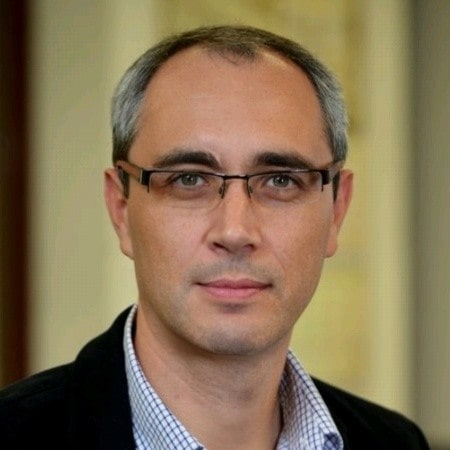Share.CreditCard: Corezoid hits the jackpot in Las Vegas – team wins Visa Challenge at Money 20/20 Hackathon
On October 21-23, 2016 a joint Corezoid + PrivatBank team went to Las Vegas. In this article, I will share observations which I hope can help other teams win prizes in world-class hackathons.
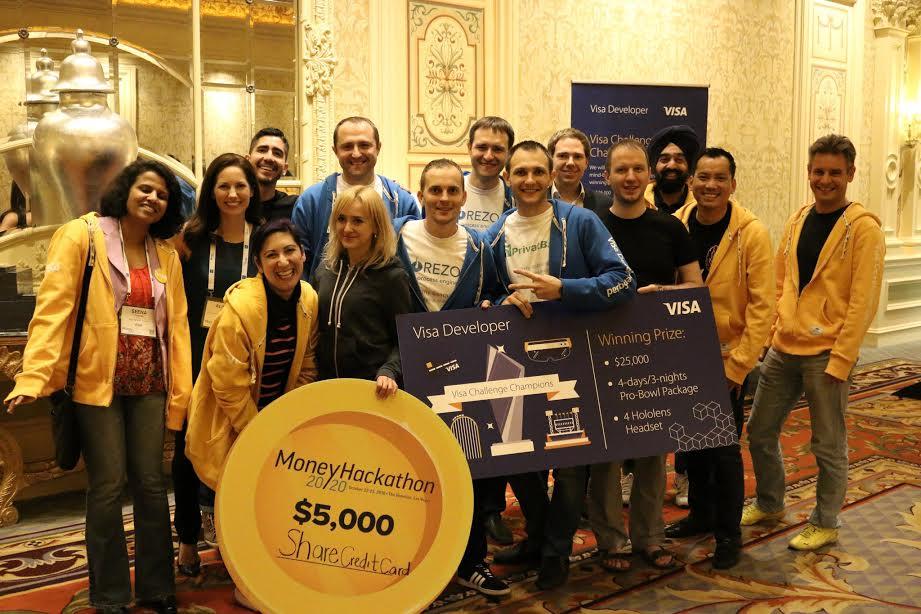 |
|---|
| Corezoid, PrivatBank, Visa |
We discovered this hackathon accidentally. One day our colleague Olha Khudik passed by a working group that was discussing Share.CreditCard and she thought about when and where to start this service best. On the same day Olha found information about the Money 20/20 Hackathon and Visa Challenge online, and shared the idea with colleagues.
About the Money 20/20 Hackathon.
Money 20/20 is one of the world's largest conferences devoted to financial services. With 30,000 participants, tickets at $3,000 and the small showcase costing about $100,000 – it is truly an elite gathering. Before the conference the organizers hold a Hackathon, where participants have 24 hours to code a prototype of "the financial technology of the future". This year the Hackathon had nine sponsors, and the total prize money amounted to $125,000 plus additional individual prizes from partners. The Hackathon’s partners include Visa, MasterCard, Ingenico, First data, World Pay, Financial Synchrony, Vantiv, Modo, Feedzai.
A Hackathon ticket cost only $10, as the organizers tried to make the event as accessible as possible for developers.
Hackathon Rules
Within 24 hours you need to write fresh code and create a working demo of the product. You can use templates for front-end design, any open source tools, and programming languages. We, of course, used Corezoid Process Engine. Development speed in Corezoid is unparalleled. Just what you need to win in hackathons. While other teams puffed away with Java\Python, etc., we instead of hard coding collected processes in the cloud on Corezoid.
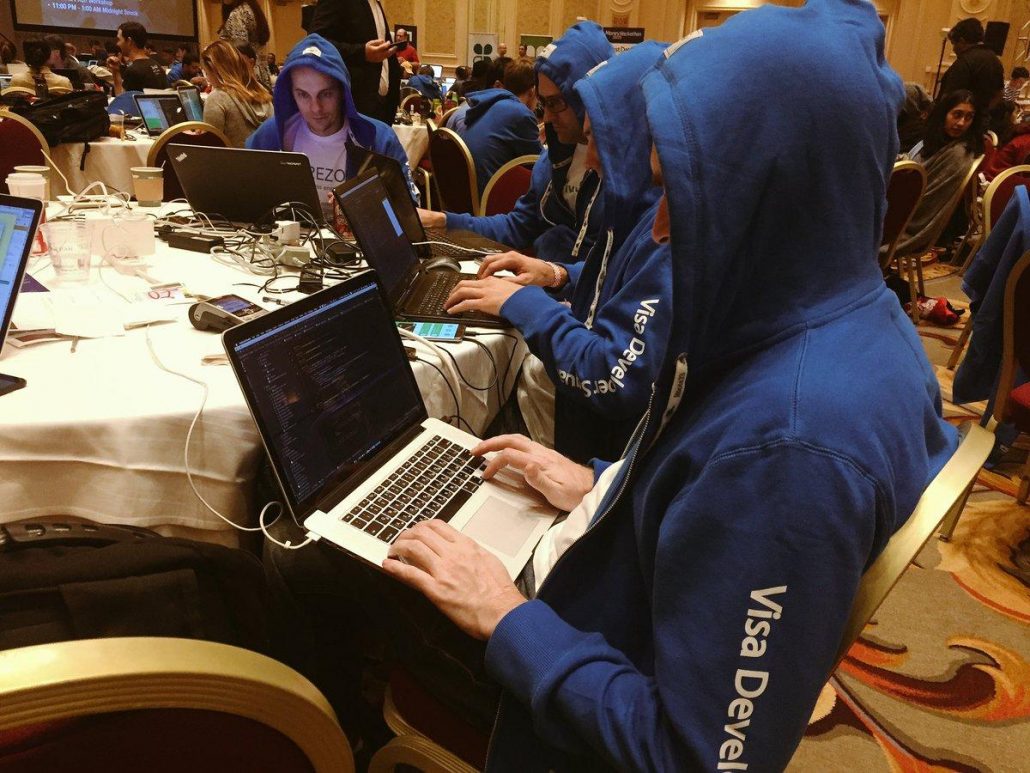 |
|---|
| Corezoid at work |
During coding teams received technical assistance from the Partners. We played for Visa, and used their Visa Token Service. Other teams experimented with APIs for antifraud from Feedzai, processing API First Data, Financial Synchrony, and MasterCard vending machine. Vantiv’s teams were amazing, trying to show the user experience if you put on a Microsoft Hololens helmet and make a check-out in augmented reality, communicating with a robot (to be honest, I did not fully understand this use-case, but their pitch seemed exciting).
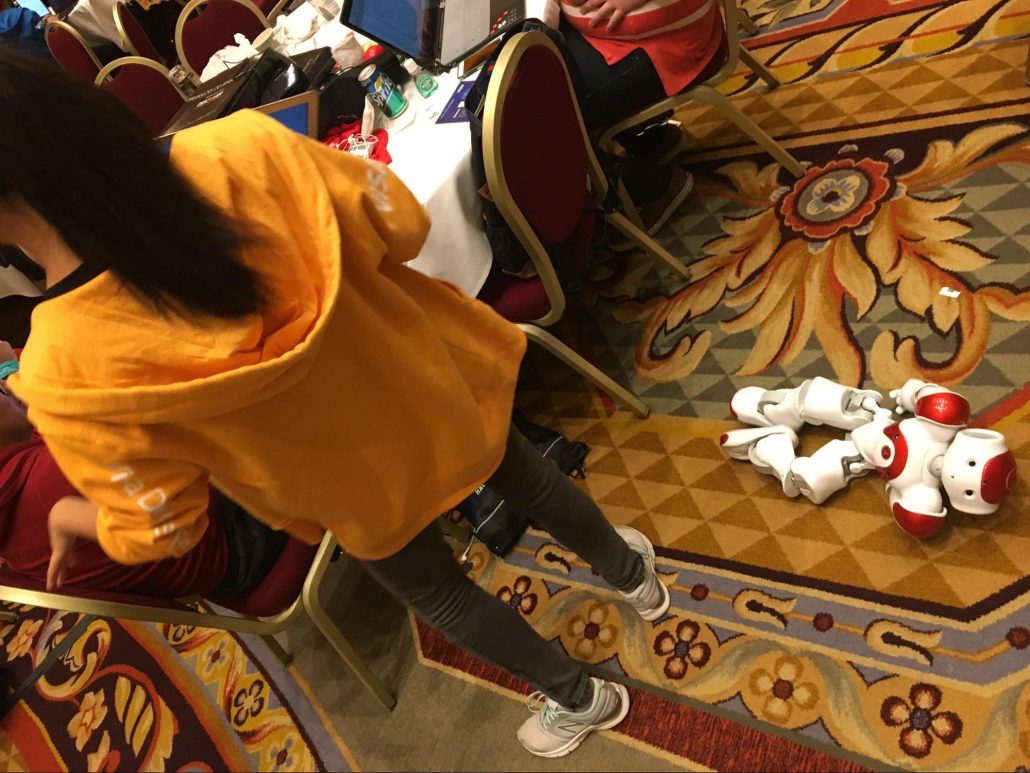 |
|---|
| One more update was too much for the robot |
After 24 hours of coding teams decide to which sponsor they will show their demo. Then, each sponsor selects two teams that will represent it on the big stage (i.e., 18 teams will be in the final). In total, 600 participants and 106 teams were in the hackathon.
Build-up
Activities around the event began long before the hackathon: own Slack channel, separate Slack and Twitter channels for communication with sponsors. For example, Visa was constantly giving useful information on its Twitter channel Visa Developers
For 10 days before the Hackathon the organizers held a separate 2-hour Webinar, and explained what is expected from participants + basic rules, and then sent a 72-slide presentation.
It is interesting that the Money 20/20 Hackathon’s organization was outsourced to AngelHack. The guys from AngelHack specialize in hackathons and know how to set up good enough Wi-Fi for 600 people, where to get a charismatic host and how not to run into the same trap.
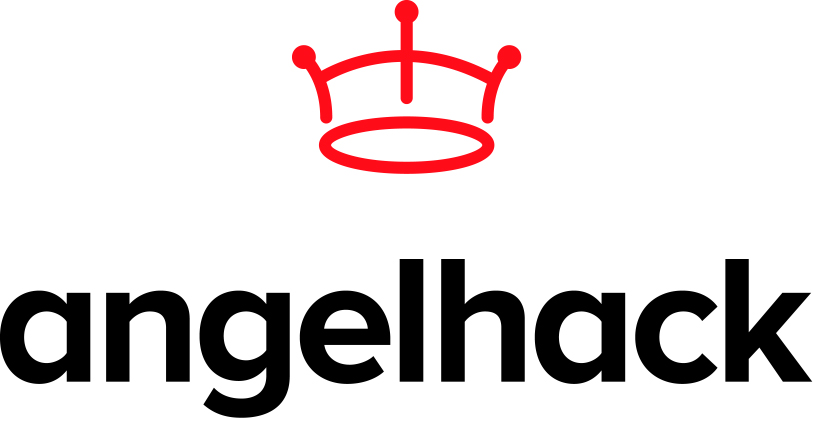 |
|---|
October 21 – the Hackathon opening. Of all the participants, we were up first. At 16:00 we were in place. We checked the Wi-Fi and the overall situation. Visa was just beginning to assemble its stand. We met with the Visa team, put organizational issues to one of the Hackathon’s organizers – Rob. Our acquaintance with Rob was very useful for us at the end. After the Hackathon Rob came over and asked if we need tickets for Money 20/20. I and my teammate Masha Hurina were happy to have 2 tickets with a total cost of $6000.
Conclusion No. 1: warm contact and simple phrases ("Hi! My name is Serhii, and this is Mariia. We are from the Share.CreditCard team. And who are you? What are you doing?") help to make useful contacts and begin to build long-term relationships.
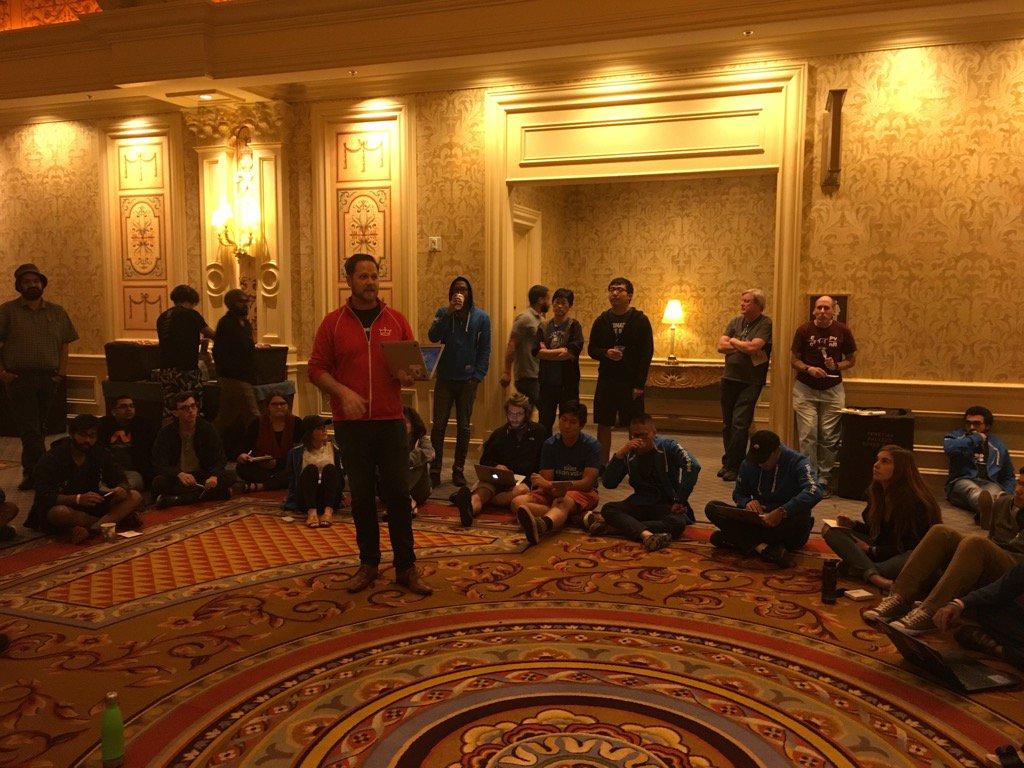 |
|---|
| Hackathon presenter Brian Collins talks about the rules of public speaking |
In the evening of the opening day the organizers threw a huge party in one of the best hang-outs in Las Vegas – Lavo Restaurant, but our team held a pitch rehearsal in a quiet place.
October 22. Hackathon beginning.
At 9:00 all the teams met in a huge hall of the Venetian Hotel. Representatives of the sponsors came and briefly told about what is happening with their company and what they expect from the participants. Joseph Pham and Ilkay Can appeared on the scene from Visa and were active and driving discussion. Visa sent a huge support group – about 20 people.
Visa gave a lot of freedom for creativity. Developers were encouraged to create their products in the field of e-commerce, Internet of things, blockchain, biometrics, virtual and augmented reality. MasterCard narrowed the opportunities (or rather turned them into a ToR): build a mobile game that interacts with a vending machine and a machine that produces things associated with the game; build an application that allows people to organize groups to finance purchases; build a car rental system, which is able to give out keys via vending machines, etc.
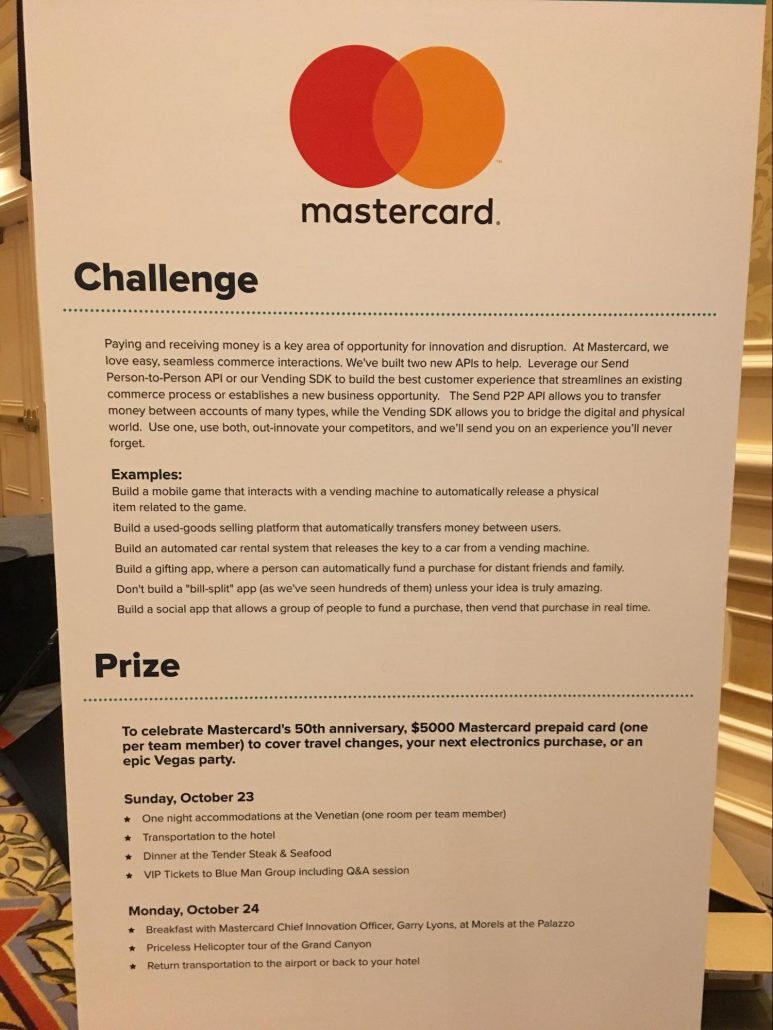 |
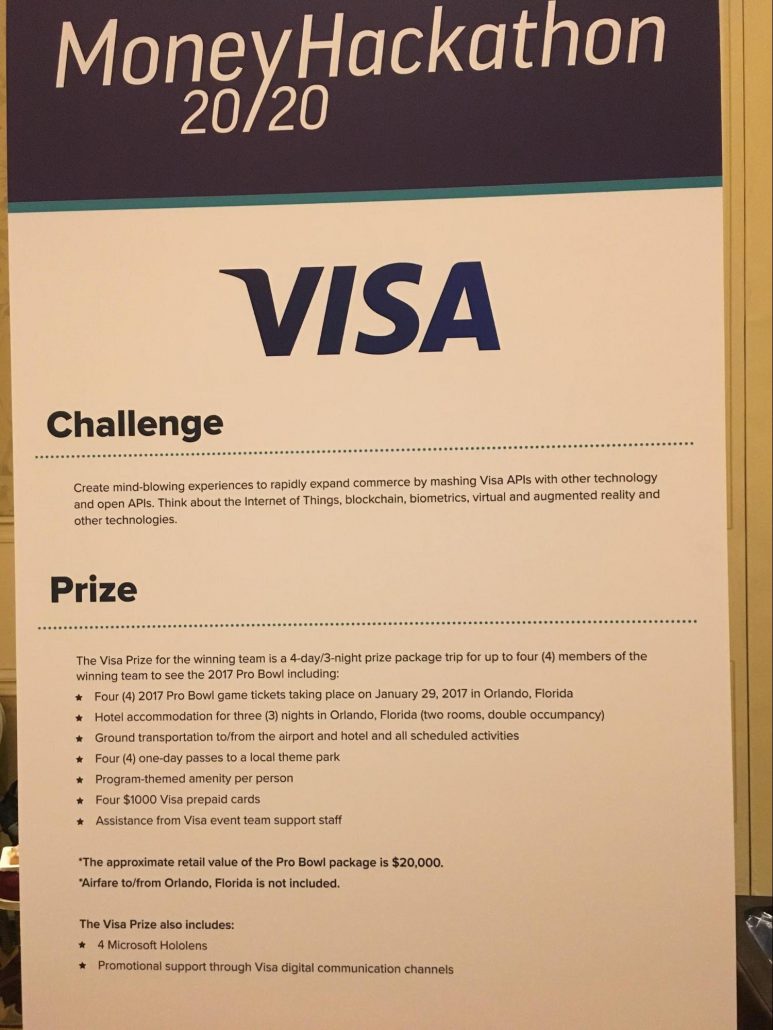 |
|---|
Then, they allow ordinary people to go onstage in order to present themselves and teams that do not have enough people.
Hackathon presenter Brian asked: "Where have we teams now from?" He heard cries of various US cities. Then someone called Montreal, Toronto. I shouted "Ukraine!", and the whole room looked at us in shock. Further geographical distance ensured that from the Hackathon’s beginning we were already well known. The fact that we came from far overseas helped us later in communication.
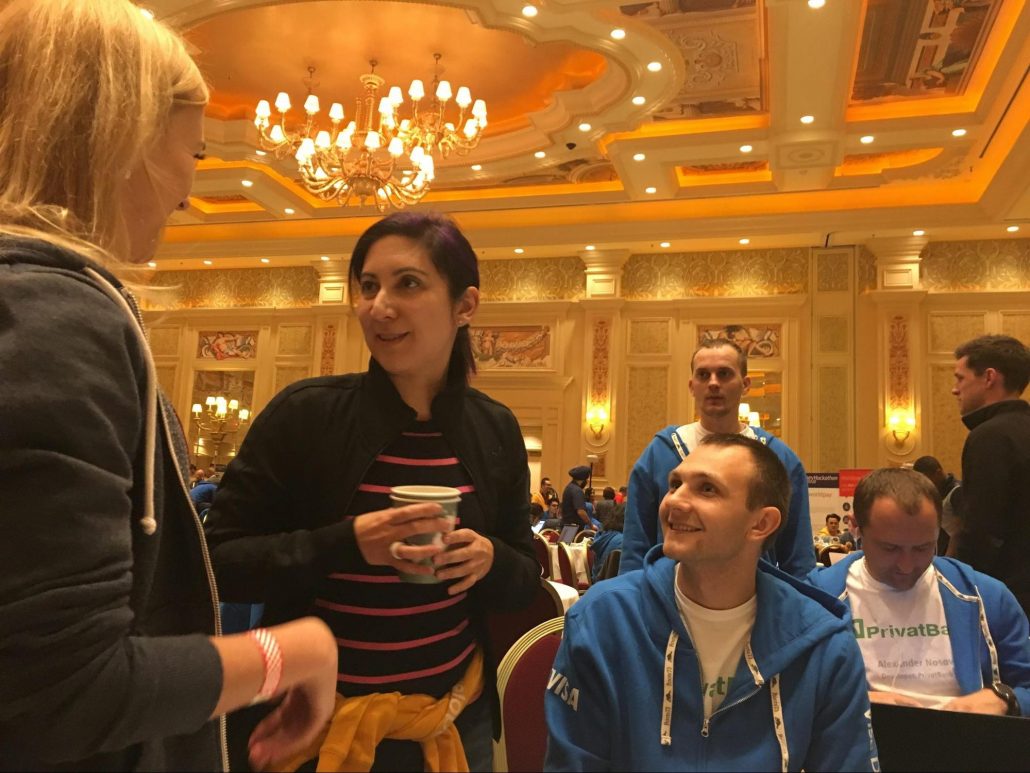 |
|---|
| Mariia Hurina practices the Share.CreditCard pitch together with Ilkay Can, Senior Director at Visa |
At 11:00 It's the Final Countdown music came on, the countdown begun, and teams started coding. At 16:00 Visa gathered an audience in a separate room where about 100 people attended. They talked about their APIs and answered questions from Hackathon participants. Then we again returned to the main meeting room.
The Share.CreditCard idea
The Share.CreditCard idea came from Oleksandr Vytiaz, Corezoid founder, Head of PrivatBank e-Business Center, when his daughter once again forgot the pin code of her card.
By this time, there were business and technological conditions for development of sharing cards. In November 2015 PrivatBank launched a service of digitization and sharing of discount cards. We noticed that people are willingly sharing access: it is enough to scan a card, and a "Share" button automatically appears next. Users "disshare" more than 30% of cards.
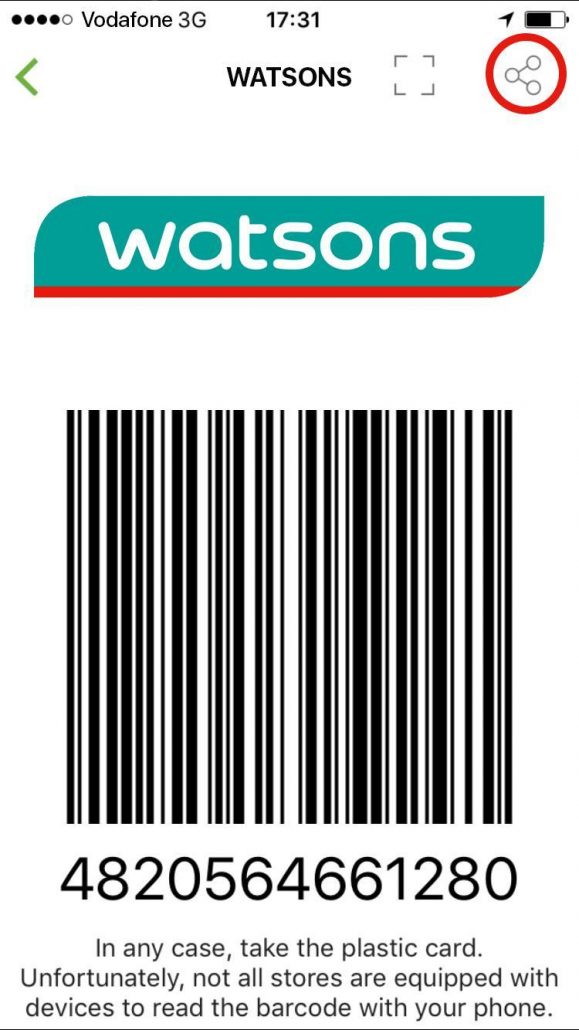 |
|---|
| Digital discount card with card sharing function |
If users are sharing discount cards, why not give them the opportunity to share access to payment cards? With time, technological capabilities have increased and matured: starting from 2011, Visa began to actively open APIs, and in March 2016 Visa put its VTS service (Visa Token Service) into operation. So all necessary components are in place for materialization of the Share.CreditCard idea, which the Corezoid-PrivatBank team brought to life in the Hackathon.
All existing payment systems, from e-mail to Bitcoin, are constructed on the principle of moving money from point A to point B. But there is a plethora of problems: it is long, expensive, and inconvenient. Within 24 hours, we created a Share.CreditCard application that gives you the possibility to share access to your cards instead of moving money. We took advantage of the Visa Token Service to tokenize the card and give the option to pay by any Android smartphone in the world.
 |
|---|
| Share.CreditCard Start Screen |
Visa Support
During the Hackathon we always 100% leveraged Visa’s people. They helped us to make our pitch perfect. Later in the afternoon the organizers led a great master class on "how to pitch". Presenter Brian explained simple rules of "public speaking": 1. Describe the problem. 2. Show the demo. 3. Draw conclusions. Be passionate. Do not use extraneous words and "aaaa", "mmmm," use pauses, change intonation, etc.
Then we did a simple exercise: had 1 minute to speak on an abstract theme (what I did last week), never using "aaaa" or "mmmm".
A good method for pitch rehearsal is to rehearse with random strangers. Mariia Hurina and I didn’t immediately understand this fact, and rehearsed together. As a result, when I heard the pitch for the hundredth time, I liked it very much, and it seemed to me to be super-clear. In fact, later we found out that people understand, at best, 10% of what you say. You show them the revolution in payments, and expect to see such reaction: "Wow! Crazy!" But a typical listener just nods his head in confusion. This greatly frustrates you. We need to rehearse so that a 7-year-old child can understand and say, "Wow!"
Hackathon organizers organized great food service, we did not need to go anywhere, had hot breakfasts, lunches, dinners, always available tea, coffee, water, cola, etc. We later joked that so you can buy tickets for $10 to the Hackathon and have a great two days to eat, to sleep in sleeping bags in the lobby, to get sponsor t-shirts and hoodies and great feelings, not even taking part in the Hackathon.
By 22:00 of the first day (thanks to Corezoid) we had a ready working build of the application, but the team wanted to be extra sure that everything would be correct, and stayed for overnight testing. Among themselves, our people agreed to take turns to sleep for 3-4 hours, so that at 8:00 in the morning we all would be OK.
In the morning the team looked surprisingly cheerful and fresh. In fact, they were awake and restless (after the night in Kyiv airport, then a flight and flight delay in Denver), but kept it together perfectly.
Suddenly, at 9:00 am, two hours before the end of Hackathon, we began to get errors. Card tokenization does not work, terminal says "Cancelled". The team was trying to quickly understand the reasons. The reason was on the side of Visa. Colleagues in Visa asked their guys not to touch anything during the time of the Hackathon, but apparently, someone inside Visa had not heard, and part of Visa IT went into maintenance ("stocktaking") because it was Sunday. Mistakes began to occur in other startups as well. To its credit, Visa quickly solved the problems and all APIs were quickly repaired. My colleague jokingly suggested to send Visa’s system administrator who decided to arrange maintenance during a Hackathon for training in Ukraine.
By the end of Hackathon at 11:00 we had everything working perfectly. The main thing was to polish the pitch. Mariia practiced everything, we came to the stands of other sponsors to pitch there. The video team of Money 20/20 came to Mariia and we trained with them.
At some point, we were approached by Stephen M. Kehoe, Visa Senior VP, Head of Global Financial Inclusion. Stephen is responsible for "Unbanked" people – poor countries in which many people do not have access to banking services. Steven liked the Share.CreditCard idea. He asked an interesting question: "Have you thought how to allow Merchants to do cash-out operations? In the poorest countries, I think such a service would be popular. People would receive a token, and go to get cash from a terminal".
The team located next to us created a service designed to simplify the payment of invoices for small and medium-sized businesses. People in Microsoft Hololens were walking around waving their arms. Amazon Echo devices were running some kind of robot. The air vibrated with excitement, innovation was in full swing.
At 12:00 it was time to pitch. Teams can go to pitch anyone – any of the nine sponsors of the Hackathon. But most of all teams went to show their demo to Visa. Visa had more solid prizes and better support. Later, Visa announced the official figures: 35% of Hackathon teams used a Visa API. Overall 22 teams came to pitch Visa, including Share.CreditCard.
One of the people who actively helped to prepare the pitch was Cyril Attia a representative of BeMyApp agency that Visa engages at such events. He's a good coach on pitches. Cyril listened to Mariia and said, "You have Rocket idea, but I did not realize that you do not make money transfers, and have written off the money from the sender's card at the moment of payment. You need to emphasize even better at the very beginning what is happening. Even you can say. Now I have a card, and this man has no card. And then tell me: Do you understand the REVOLUTION?"
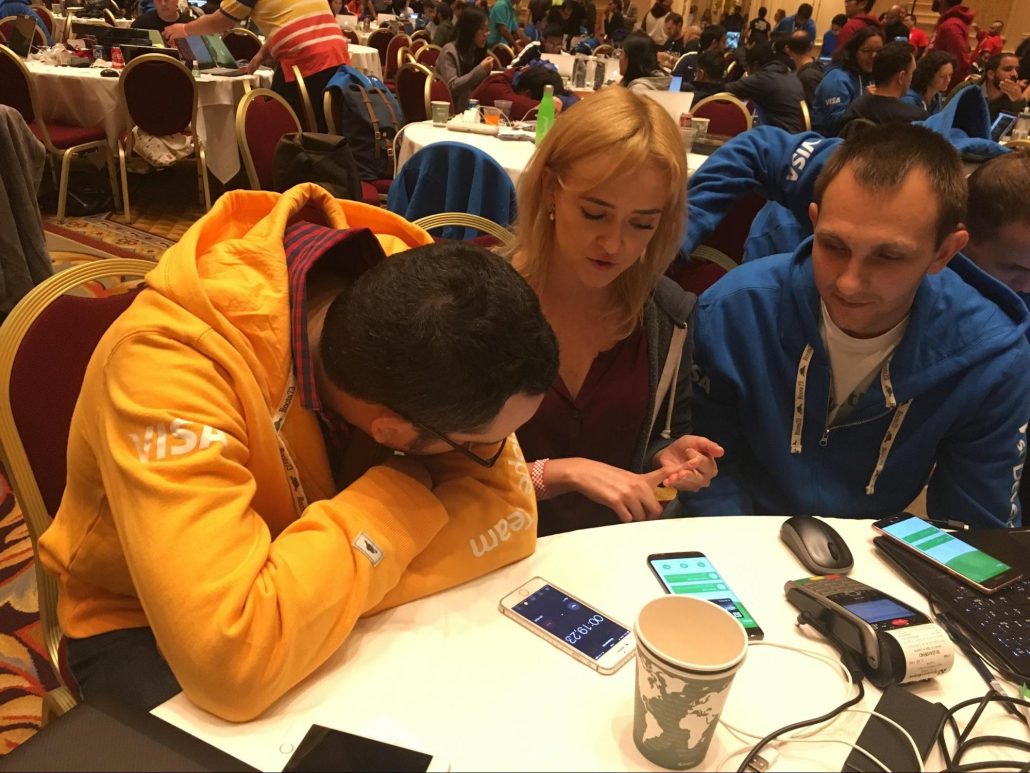 |
|---|
| Mariia Hurina and Cyril Attia pitch training |
Mariia remarkably turned out this phrase, which eventually was included in the Visa final promo video (@0:48 seconds).
We went to pitch first. It was uncomfortable to make a demo: playing loud music, judges from Visa sat in a semicircle, the first guys even didn’t get chairs. The smartphone screen was not very visible from afar. Mariia paid a lot of attention to the details of the application, and exceeded the allotted time (2 minutes per pitch). We were unhappy with our pitch.
We could change nothing, so we decided to take a walk to get some air, and then went to the main hall, which began to include other Hackathon participants and the first visitors of the Money 20/20 Conference.
Then the teams were announced as 3 lots of 6 teams each. Teams climbed on the stage and showed their demo one at a time.
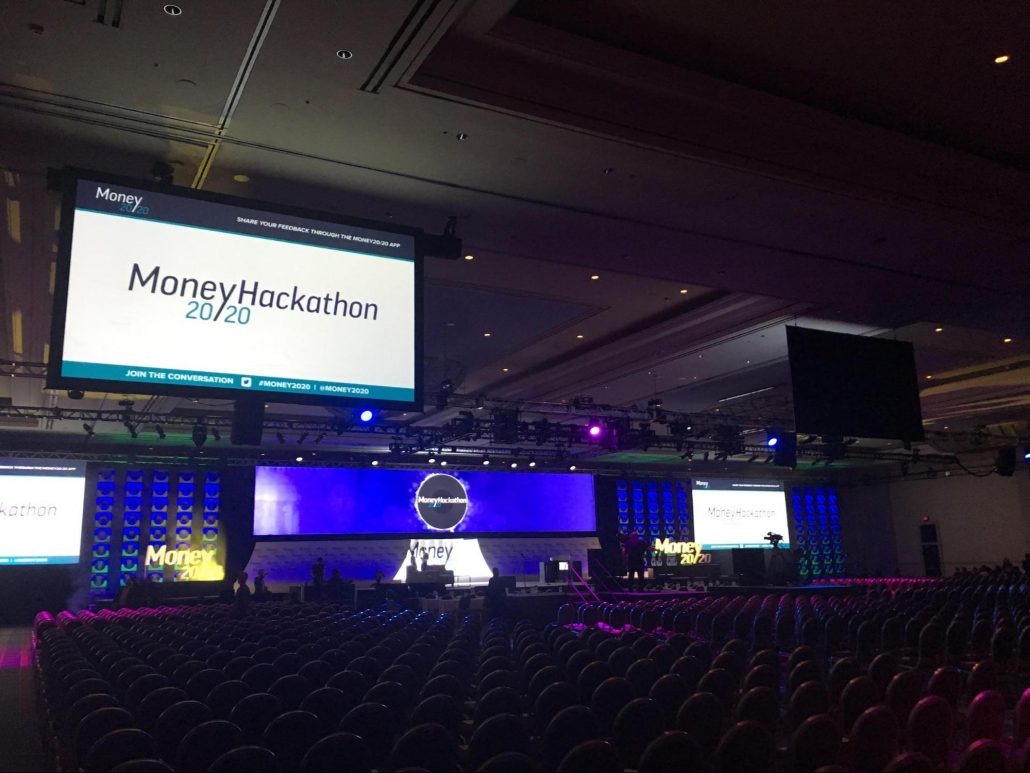 |
|---|
| Main Stage of Money 20/20 |
Here are some finalist ideas:
Frog. Someone plays a violin. The system recognizes the quality of playing. If played well – gets the money. The idea: parents encourage children to learn to play the violin. Traction. Musicians share profits with their first fans. The more you listen to music, the more your income (if the artist is gaining popularity). "Music taste as an investment portfolio". Holo Ventiv. The man with the Microsoft Hololens helmet (Augmented Reality). The robot on the scene. It does Qigong exercises. You pay the robot for what it teaches you. Very strange. In the second six, we are also absent. We were sitting in a room listening to pitches, and then Brian called the last six, and Share.CreditCard was in it. So we learned that we won the Visa Challenge and $25,000.
We went behind the scene to prepare, Mariia Hurina got a second wind and continued to actively rehearse. Finally, everything turned out fine. Mariia’s pitch was 10 times better than what happened in the 1st round. Mariia sounded sincere, natural, and got more applause than the other participants.
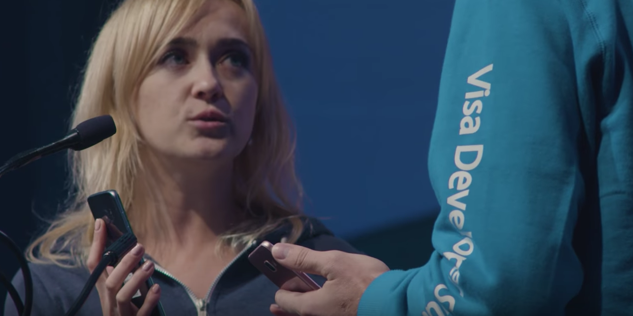 |
|---|
| Mariia Hurina presents Share.CreditCard on the main stage |
Then at 17:40 the Money 20/20 Conference began, and at 18:30 – the awards for winners. Prizes were awarded to 10 teams of 18 that were on the stage. Five teams took first place and $20,000 in prize money. In addition, five teams including Share.CreditCard got 2nd place and $5,000 in prize money. Another eight teams got nothing (only 3rd place and prizes from their sponsors).
The winner of the Hackathon was Clever (in addition to a cash prize of $20,000, this team got the right to place its showcase at the Money 20/20 show). The backbone of the idea: Amazon Alexa speaks voice tips/information useful to the seller (your sales yesterday jumped by 10%, because a large lot was requested by a buyer from New York, and another note – consumables selling started there that you would normally buy).
Cash prizes for Corezoid were nice ($30,000 in cash and $42,000 in prizes – $72,000 in total), but the main thing is Visa’s willingness to promote Share.CreditCard in their digital channels. The first blog post by Visa has already appeared.
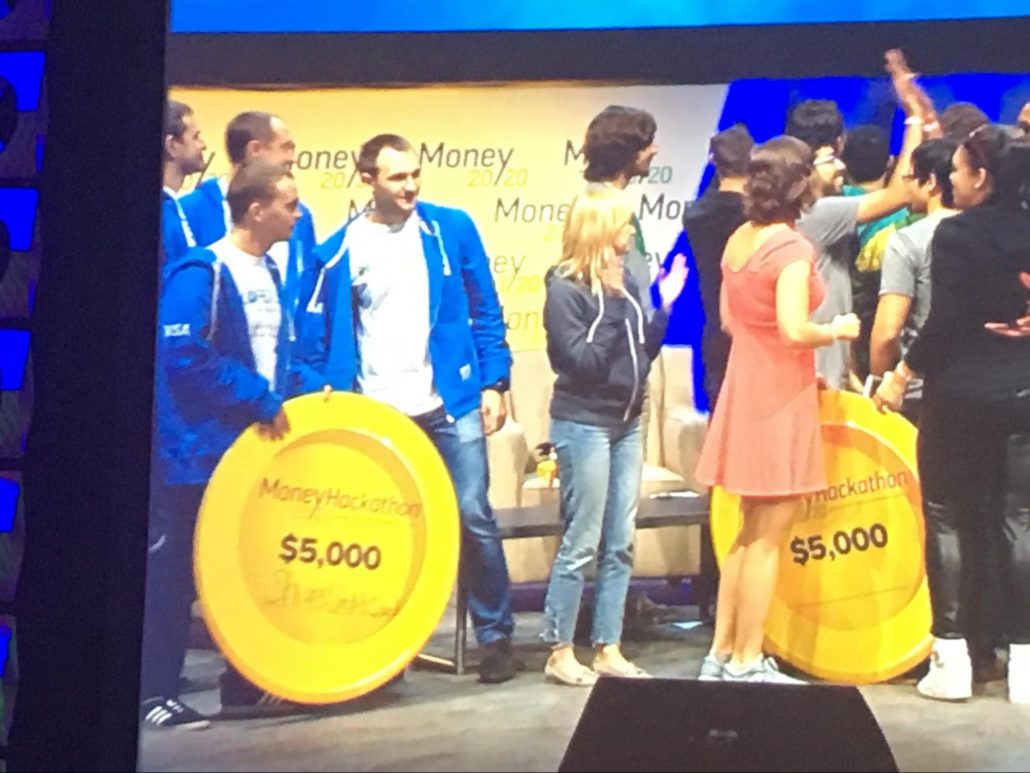 |
|---|
| Corezoid with the prize on stage |
Later, when we met with the Visa team in Foster City, our team photos appeared on Visa screens in the office, Visa employees know Mariia Hurina personally, it was very nice.
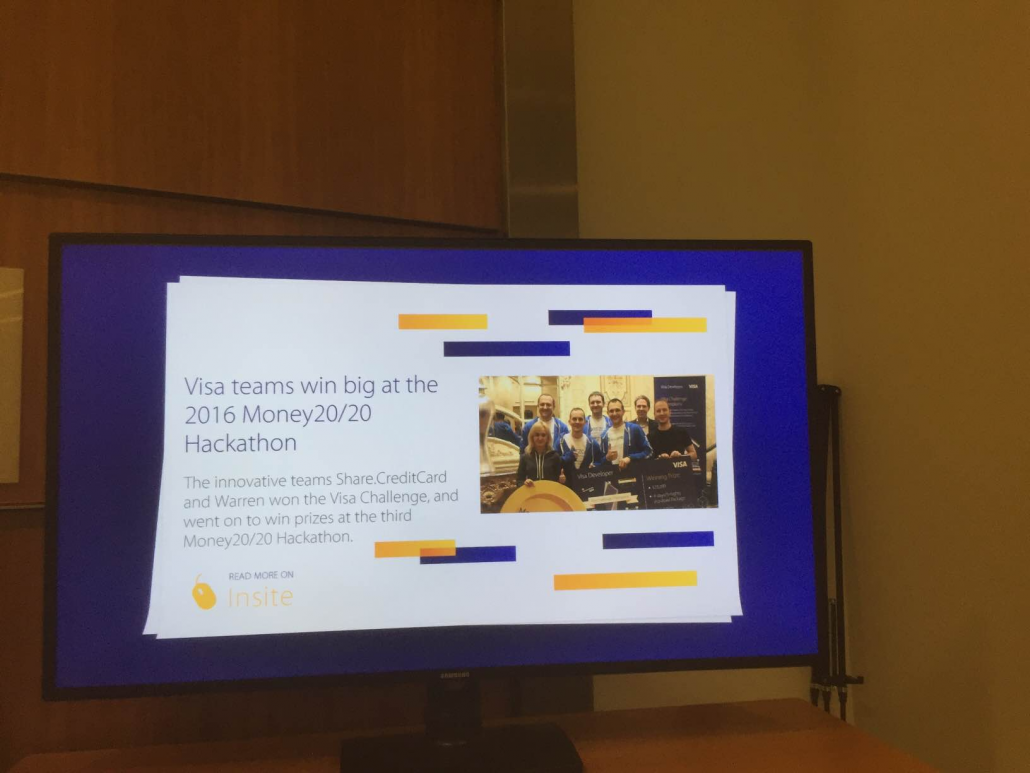 |
|---|
| Video on the screen in the Visa office in Foster City |
A hackathon needs serious preparation, especially if you use 15 APIs in the product. Boasting of an easy victory isn’t realistic.
Particular attention should be paid to pitch rehearsal. The pitch is at least 50% of success, and sometimes more. Important things at a hackathon besides a working demo, are emotions, shows, and storytelling. Few can appreciate the efforts made in the back-end. However, we have a very powerful back-end on Corezoid. Really, it is ready not only for the demo, but for live release.
Thanks for reading about our experience :) Join us on social networks. Use Corezoid and win in hackathons, good luck!
https://www.facebook.com/corezoid/
Serhii Danylenko, Corezoid CMO, Dnipro – Las Vegas – Dnipro
